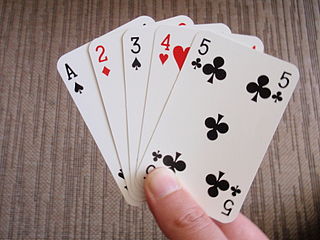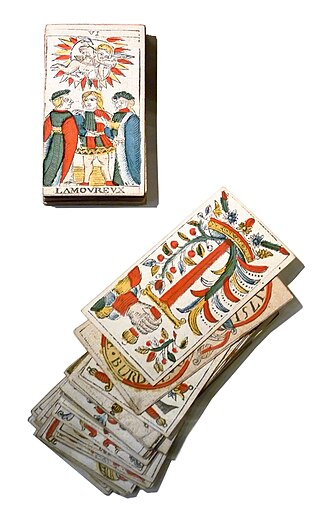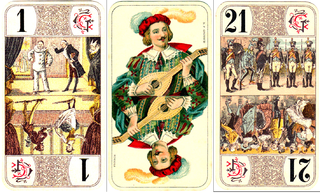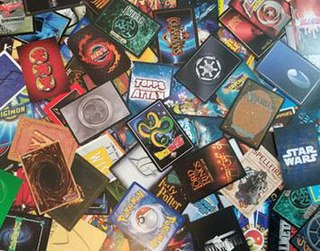Related Research Articles

A card game is any game that uses playing cards as the primary device with which the game is played, whether the cards are of a traditional design or specifically created for the game (proprietary). Countless card games exist, including families of related games. A small number of card games played with traditional decks have formally standardized rules with international tournaments being held, but most are folk games whose rules may vary by region, culture, location or from circle to circle.

A playing card is a piece of specially prepared card stock, heavy paper, thin cardboard, plastic-coated paper, cotton-paper blend, or thin plastic that is marked with distinguishing motifs. Often the front (face) and back of each card has a finish to make handling easier. They are most commonly used for playing card games, and are also used in magic tricks, cardistry, card throwing, and card houses; cards may also be collected. Playing cards are typically palm-sized for convenient handling, and usually are sold together in a set as a deck of cards or pack of cards.

The United States Playing Card Company is a large American producer and distributor of playing cards. It was established in 1867 as Russell, Morgan & Co. and founded in Cincinnati, Ohio in its current incarnation in 1885. Its many brands include Bicycle, Bee, Tally-Ho, Champion, Congress, Aviator, Aristocrat, Mohawk, Maverick, KEM, Hoyle and Fournier. It also produces novelty and custom playing cards, and other playing card accessories such as poker chips. For decades the company was based in Norwood, Ohio, but as of 2009, the USPC is currently headquartered in the Cincinnati suburb of Erlanger, Kentucky.

Spanish-suited playing cards or Spanish-suited cards have four suits, and a deck is usually made up of 40 or 48 cards. It is categorized as a Latin-suited deck and has strong similarities with the Portuguese-suited deck, Italian-suited deck and some to the French deck. Spanish-suited cards are used in Spain, southern Italy, parts of France, Hispanic America, North Africa, and the Philippines.

Newell Brands Inc. is an American manufacturer, marketer and distributor of consumer and commercial products. The company's brands and products include Rubbermaid storage and trash containers; home organization and reusable container products; Contigo and Bubba water bottles; Coleman outdoor products; writing instruments glue ; children's products ; cookware and small appliances and fragrance products.

The Tarot of Marseilles is a standard pattern of Italian-suited tarot pack with 78 cards that was very popular in France in the 17th and 18th centuries for playing tarot card games and is still produced today. It was probably created in Milan before spreading to much of France, Switzerland and Northern Italy. The name is sometimes spelt Tarot of Marseille, but the name recommended by the International Playing-Card Society is Tarot de Marseille, although it accepts the two English names as alternatives. It was the pack which led to the occult use of tarot cards, although today dedicated decks are produced for this purpose.
Cartamundi Group is a company based in Turnhout, Belgium, that manufactures, produces, and sells board games, card games, collectible card games, packages, and playing cards through its manufacturing and sales subsidiaries. The name of the company in Latin means cards for the world. It is one of the world's largest playing card manufacturers.

Naipes Heraclio Fournier S.A. is a playing card manufacturer based in Vitoria, Spain with a factory in Legutio. It has been owned by the United States Playing Card Company since 1986, which was acquired by Belgium–based Cartamundi in 2020.

Ganjifa, Ganjapa or Gânjaphâ, is a card game and type of playing cards that are most associated with Persia and India. After Ganjifa cards fell out of use in Iran before the twentieth century, India became the last country to produce them. The form prevalent in Odisha is Ganjapa.

Troggu is a member of the tarot family of card games. Synonyms for the game's name are: Trogga, Tappu and Tappä. It is played in the area of Visp, Switzerland, in Upper Wallis, especially in St. Niklaus and Grächen. After Troccas, it is the second most played tarot card game in Switzerland.

The Bourgeois Tarot deck is a mid-19th century pattern of tarot cards of German origin that is used for playing card games in western Europe and Canada. It is not designed for divinatory purposes. This deck is most commonly found in France, Belgian Wallonia, Swiss Romandy and Canadian Québec for playing French Tarot; in southwest Germany for playing Cego and Dreierles; and in Denmark for Danish Tarok.
The Tarocco Piemontese is a type of tarot deck of Italian origin. It is the most common tarot playing set in northern Italy, much more common than the Tarocco Bolognese. The most popular Piedmontese tarot games are Scarto, Mitigati, Chiamare il Re, and Partita which are played in Pinerolo and Turin. This deck is considered part of Piedmontese culture and appeared in the 2006 Winter Olympics closing ceremony held in Turin. As this was the standard tarot pack of the Kingdom of Sardinia, it was also formerly used in Savoy and Nice before their annexation by France. Additionally, it was used as an alternative to the Tarocco Siciliano in Calatafimi-Segesta, Sicily. Outside of Italy, it is used by a small number of players in Ticino, Switzerland and was used by Italian Argentines.

A collectible card game (CCG), also called a trading card game (TCG) among other names, is a type of card game that mixes strategic deck building elements with features of trading cards. It was introduced with Magic: The Gathering in 1993.

Batons or clubs is one of the four suits of playing cards in the standard Latin deck along with the suits of cups, coins and swords. 'Batons' is the name usually given to the suit in Italian-suited cards where the symbols look like batons. 'Clubs' refers to the suit in Spanish-suited cards where the symbols look more like wooden clubs.

Aluette or Vache ("Cow") is an old, plain trick-taking card game that is played on the west coast of France. It is played by two teams, usually of four people, but sometimes also of six. It is unusual in using a unique pack of 48 Spanish playing cards and a system of signalling between playing partners. The French colloquial names for the game, jeu de la Vache or Vache, refer to the cow depicted on one of the cards.

ASS Altenburger is since 2003 the trademark of the German playing card manufacturer Spielkartenfabrik Altenburg, based in the town of Altenburg. The firm is owned by Cartamundi, of Turnhout, Belgium. ASS claims to be the market leader in Germany for playing cards. Every year almost 40 million packs of cards of many different types are manufactured in Altenburg.

The Tarot de Besançon, also called the Besançon Tarot, describes an historical type of Tarot pack used for playing card games that was made in south Germany, France and Switzerland, including the town of Besançon.
Grimaud is a brand of playing cards published by France Cartes Cartamundi, a manufacturer of playing cards and board games based in Lorraine.
Thierry Depaulis is an independent historian of games and especially of playing cards, card games, and board games. He is President of the association Le Vieux Papier, a member of the editorial board of the International Board Game Studies Association, and a member of the board of directors of the foundation of the Swiss Museum of Games. He was President of the International Playing-Card Society from 2017 to 2022.

The Cartes de Suisses are an 18th-century standard pattern of Tarot playing cards that were initially produced in Switzerland, but later in the Austrian Netherlands, now part of Belgium. As a result they are also referred to as the Flemish Tarot or the Belgian Tarot.
References
- ↑ "Brands Archive". Cartamundi France (in French). Retrieved 2 September 2023.
- ↑ l'Association des Créateurs et Fabricants de Jouets Français at acfjf.fr. Retrieved 5 September 2020.
- ↑ Maître Cartier at cartamundi.fr. Retrieved 5 September 2020.
- ↑ Grimaud at cartes-grimaud.fr. Retrieved 5 September 2020.